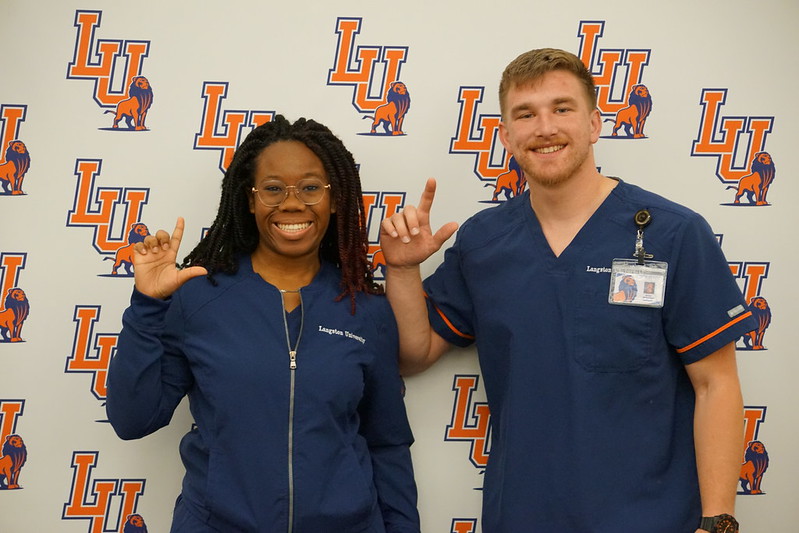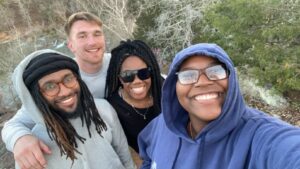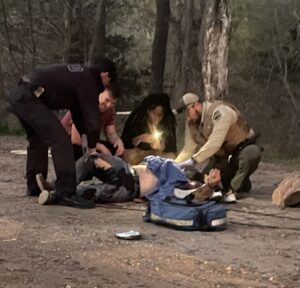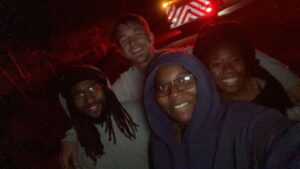Nursing Students Save Man’s Life During Spring Break

by Jet Turner and Ellie Melero
The sound of running water and chittering animals filled the late March air as the river cut its way around rocks, whisking up droplets of water that splashed the faces of the four Langston University students who had come to the Blue River for spring break.
Asher Bellavigna, Jalani Doolin, Mykah Sellers and Soli Pannell had come to the Blue River in Tishomingo to escape the stresses of school, but their peaceful afternoon was interrupted when a gunshot echoed through the hills.
Pannell’s first instinct was to run––they were too close to the campsites for it to have been a normal hunting shot––but Bellavigna, an Ardmore native and regular to the Blue River campgrounds, figured there must have been an animal in a nearby campsite someone was trying to scare away.
“There’s a lot of wildlife out there,” Bellavigna said. “So that’s what I was thinking it was, there’s an animal or there’s something nearby. Maybe he shot a snake, or maybe it was just an accident.”
The group waited, listening intently for any other strange noises, and relaxed when no other shots followed.
By then the sun had begun to sink behind the dead pines, so Bellavigna asked his friends if they wanted to continue exploring around the river or head back to his parents’ campsite, where they would stay for the night.
Surprising even himself, Doolin suggested they keep exploring the river.

“I’m not really like an outside person,” Doolin said. “I just had a feeling like we should just keep walking around. It was just a feeling. And it turned out to be something bigger than expected.”
The group trekked up a nearby hill and cut to the left, heading back toward the main campground road. A weird, eerie feeling began to settle over Pannell before she felt two hands push her to the side.
Bellavigna was the first to hear a faint car engine, and as the Game Warden’s vehicle barreled up the road, he pushed his friends to safety. He watched the car disappear down the road in the direction they’d just come, and he knew there must be an emergency somewhere for the warden to drive so fast in the campgrounds. Suddenly, the sound of a blaring car horn drew his gaze to the campsite the warden had just passed.
A 12-year-old boy was frantically honking the car horn while a man lay on the ground by the fire pit, clutching his chest.
Bellavigna sprang into action, running straight for the campsite and calling for Pannell to follow after him.
“I did start running over there thinking, ‘Heart attack, what am I going to do?’” Bellavigna said. “Then I see the blood, and that was when it registered: gunshot.”
It was later revealed that in a bizarre accident, the man’s loaded pistol had fallen out of his breast pocket when he stumbled on his way to make popcorn, firing a bullet that ricocheted against a rock before going through the man’s knee and lodging itself in his chest.
Pannell arrived at the campsite right after Bellavinga, with Doolin and Sellers in tow. She, too, realized this must have been the source of the gunshot and immediately began looking for the weapon. After quickly verifying the gun wasn’t in position to go off again, Pannell and Bellavigna got to work.
Both third-year nursing students at Langston, Pannell and Bellavigna’s training kicked in as they assessed the man’s injuries. Bellavigna began applying pressure to the man’s chest while Pannell scanned the campsite for anything that could be used to help Bellavigna staunch the flow of blood. She found a clothesline with clothes and towels hung to dry, grabbed them and handed them to Bellavigna.
“Asher worked on putting pressure on the guy’s knee where the bullet had entered at first,” Pannell said. “Then, as I’m looking up, I see that his upper half is covered in blood, so I’m trying to get his jackets and stuff off while holding pressure on the wound that was up there.”
As Bellavigna and Pannell worked, Doolin and Sellers got out of their way. Doolin’s face had gone pale at the sight of the man’s injuries, so Pannell directed him to chase after the warden’s car and bring him back. She asked Sellers to check on the boy, who had stopped honking the horn and was trying to wrangle his clearly distressed dog.
Doolin, a psychology major, ran for what felt like a mile to the end of the campground road until he finally caught up with the Game Warden’s vehicle. Doolin got the warden’s attention and told him that, if he was looking for someone who needed help, he passed him and needed to turn around.
The warden quickly turned the car around and headed back toward the campsite, leaving Doolin to walk back.
“I ain’t never run like that in a minute,” Doolin said. “I walked back. I took my time. I needed to catch my breath.”
Meanwhile, back at the campsite, Bellavigna and Pannell continued to administer first aid. The duo found themselves using the knowledge they learned in Langston University’s School of Nursing and Health Professions, such as the ABC’S (Airway, Breathing, Circulation and Safety).

The man was experiencing an adrenaline rush in addition to the obvious blood loss, and he rambled as he tried to piece together how he shot himself. Because he was talking, they knew his airways were clear. The bullet clearly did not puncture his lung, and his breathing, although rapid from the shock and adrenaline, was uninterrupted. He was pale from blood loss, and the nursing students knew if he passed out there would be a whole other set of issues to deal with. So the two students tried to keep him talking.
“The main goal was for sure to keep him alert and oriented,” Pannell said. “You never want someone who’s losing that much blood to lose consciousness. So just keep them talking and everything like that.”
As they waited for help to arrive, Bellavigna and Pannell worked together as a team. Although they had never worked in clinical situations together before, they both said it felt seamless to work with each other. They kept cool heads, they communicated clearly and efficiently, and they didn’t let their senses of urgency turn into panic.
It was getting dark when the Game Warden arrived about 10 minutes later, and the group had begun using their phone flashlights to see. Bellavigna and Pannell had already put the man’s leg in a makeshift tourniquet, and they were cutting away clothes to find where exactly the bullet had lodged so as to better apply pressure. The warden was already on the phone with an emergency operator.
About 20 minutes later, the campsite was illuminated with the red and blue lights of an ambulance.
“Once the ambulance showed up (a paramedic) came and got me because I was still in the mode of trying to lock in,” Pannell said. “(The paramedic) said we did what we needed to do, so we stepped back and gave the story to the Game Warden and police for reporting.”
Bellavigna and Pannell, along with Doolin and Sellers, continued to help by holding flashlights for the paramedics as they picked up the work the two nursing students began.
The injured man was eventually airlifted to a hospital where he received life-saving treatment.
The friends returned to Bellavigna’s parents’ campsite, talking about everything that had happened as they tried to process the shocking turn their spring break trip had taken.
As the night pressed on, Bellavigna found himself unable to sleep as the events of the evening rushed through his head. He knew there was nothing more he could have done, but he couldn’t stop wondering if there was anything different the nursing duo should have done. For Pannell, the reality of saving the man’s life didn’t set in until the next day.
Although they had come to the Blue River to forget about school and destress, helping to save a man’s life confirmed for both students that they had chosen the right career path and were pursuing it at the right institution.
“Before I even got into nursing school, I knew I wanted to work in the ER or ICU,” Bellavigna said. “I like the faster pace and adrenaline. This is what I want to do; I wouldn’t mind spending a good portion of my life doing things like this… I’m on the right path. I’m on the right track.”
“I’d say similar feelings,” Pannell said. “I definitely had a realization of, ‘Oh, I can do this.’ … Having that type of experience just on a random base, a random moment, it really did confirm, ‘You’re good. You’re in the right field. You can do it.’”





